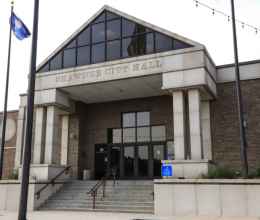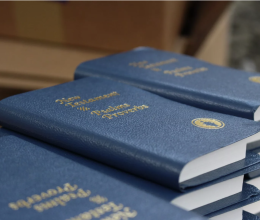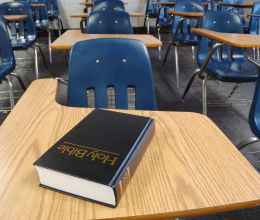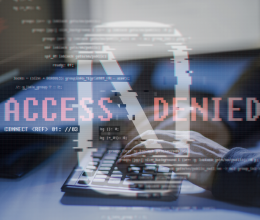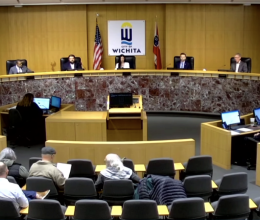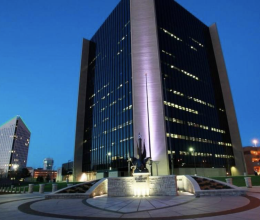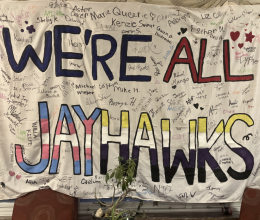
August 14, 2020
By First Class Mail and Email to:
Chief Frank Donchez
Overland Park Police Department
12400 Foster Street
Overland Park, KS 66213
Re: OPPD’s Response to Black Lives Matter Protests
Dear Chief Donchez,
We are writing on behalf of The Miller Dream LLC to express our concerns about the Overland Park Police Department’s (OPPD) excessive, militarized response to a peaceful protest that took place on July 24, 2020. We have received reports that your department responded to the protest in riot gear, authorized officers to withhold their badge numbers and other identifying information, and targeted protest leaders with harassment and arrest. This conduct raises serious constitutional concerns and undermines community trust. For the reasons outlined below, we ask that you provide a timely response to our records request and meet with us at your earliest convenience.
- Factual Background
The Miller Dream LLC has been holding weekly protests against police brutality throughout the Kansas City metro area since early June 2020, including a July 11th march in Overland Park. These protests have been uniformly peaceful and required minimal police presence. For instance, your department dispatched only two squad cars to Miller Dream’s July 11th Overland Park protest. Your officers acted as escorts during the July 11th protest and helped block traffic for protesters who elected to march in the streets. OPPD’s interactions with protesters were reportedly cooperative throughout the July 11th action, and the only contentious behavior came from residents who were angered by the protesters’ message.
Due to their overall positive experience on July 11th, Miller Dream organized another march in Overland Park along the same route and through the same neighborhood for July 24th. The day of the protest, Overland Park’s Public Safety Director contacted Miler Dream organizer Patrick Wortuba and asked whether the group had invited armed protesters to attend the evening’s march. Mr. Wortuba explained that they had not invited any armed groups and protesters had never brought weapons to any of their past actions.
Miller Dream began their protest at the Johnson County Community College (“JCCC”) campus at or about 6:00 p.m. OPPD officers approached Miller Dream organizers and asked about their action plan. When organizers explained that they intended to march along the same route they used on July 11th, OPPD officers told the organizers that it was important for them to stay on the sidewalk despite having helped block traffic on the same streets during the July 11th march. The organizers responded that they intended to march in the street if they had enough people.
At or around 8:00 p.m. protesters began marching from JCCC towards a residential neighborhood. At or around 8:50 p.m., two residents came out of their home and yelled at the protesters to leave the neighborhood. One of the residents physically accosted a teenage girl who was attempting to deescalate an argument between the resident and a protester. There were several OPPD officers located across the street from the residents’ home when protesters arrived but they did not intervene when the residents confronted the protesters. Several minutes after the protesters encountered the angry residents, approximately 30 officers wearing shields and other riot gear began following the protesters on foot. The officers had zip ties in hand and began telling protesters who were marching in the street to move to the sidewalk. OPPD officers repeated this command even though there were no vehicles in the street other than cars that were associated with the march.
Once the officers got closer to the protesters, individuals who had been marching in the street began to disperse. Stacy Shaw, an attorney who was coordinating legal observers, remained in the street in order to help the observers get in position to document the approaching officers. Ms. Shaw was wearing a vest that said “Attorney” and was clearly in the street to help gather information about the police response. Even though there were a number of protesters still in the street, Ms. Shaw was the first person arrested. Indeed, OPPD officers bypassed other protesters in order to arrest Ms. Shaw. She was not the only individual in an apparent leadership role that OPPD officers targeted; we received multiple reports that your department singled out the chant leader and an organizer holding a bullhorn, threatening them with arrest if they did not move to the sidewalk more quickly.
OPPD officers ultimately arrested three protesters for violating municipal code 12.04.068 which prohibits walking in the street where use of the sidewalk is practicable.[1] Legal observers were unable to identify the officers who made the arrests as none of the officers were wearing badges. Additionally, arresting officers refused to respond to legal observer inquiries for their identifying information.
Over the last two weeks, OPPD has defended its decision to deploy dozens of officers in riot gear to a peaceful protest. On July 27th, you called Mr. Wortuba and told him that your department needed to display such force because you had heard rumors that “two warring groups with guns” were planning to show up at the protest. On or about August 5th, the Director of Public Safety told Mr. Wortuba that the riot gear was worn because OPPD had received angry complaints from residents following Miller Dream’s July 11th protest.
You have also doubled down on the decision to authorize officers policing the protest to hide their badge numbers. The decision to permit officers to withhold identification was only for the July 24th protest and purportedly motivated by concerns of doxing.[2] However, it is unclear why OPPD believed individuals attending the July 24th protest posed a unique doxing threat.[3]
- Legal and Policy Concerns
a. OPPD’s Response to the July 24th Protest Runs Afoul of the First Amendment.
OPPD’s response to the July 24th protest raises several First Amendment concerns. Although this list is not exhaustive, these examples raise concerns about the constitutionality of OPPD’s response to future protests organized by Miller Dream or others members of the Black Lives Matter movement.
First, OPPD seems to have selectively enforced restrictions on street protests. Public streets are traditional public fora and “have immemorially been held in trust for the use of the public and, time out of mind, have been used for purposes of assembly, communicating thoughts between citizens, and discussing public questions.”[4] While OPPD is permitted to enforce facially neutral street use ordinances, it must do so in an evenhanded manner.[5] OPPD’s decision to enforce the ordinance on July 24th but not on July 11th strongly suggests a reason for enforcement unrelated to public safety.
Second, OPPD’s decision to target protest leaders raises questions of unconstitutional retaliation.[6] Targeting particular individuals for arrest because they are running a protest runs afoul of the First Amendment.[7]
Finally, any decision to engage in more aggressive policing tactics in response to a protest because that particular protest might draw a negative community response is antithetical to the First Amendment. The government cannot impose additional restrictions on a protest based on the controversial nature of the message or likelihood the event will draw demonstrators with opposing viewpoints.[8] Accordingly, your department’s increased presence on July 24th cannot be justified by Overland Park residents’ angry response to Miller Dream’s past marches.
b. The Use of Riot Gear Was Inappropriate and Counterproductive to Maintaining a Peaceful Environment Where Protesters Could Exercise Their Rights.
Responding to peaceful protests in riot gear can have a chilling effect on the rights of protestors to lawfully assemble and voice their message.[9] When you sent a large number of officers to the July 24th protest dressed in this manner, zip ties in hand, it delivered a message to the protestors that the officers were there to arrest and punish, rather than protect and serve. The protest activity on July 24th was nonviolent and similar to prior protests organized by Miller Dream, with the exception of an interaction between protestors and some local Overland Park residents who wanted the protest to end. This single interaction simply does not merit 20 officers responding in riot gear ready to arrest lawful protestors.
Responding in riot gear can also increase the risk of violent clashes between protestors and the police. Scholars have noted that the “escalated force model”—where police make a dominate show of force through various response tactics, including wearing riot gear, to force compliance with their orders—often “amplifies conflict with protestors and instigates violence.[10] Studies have also shown that access to militarized equipment, including riot gear, “increases officers’ tendency to use military tactics to resolve conflicts.”[11] For this reason, former President Obama’s Task Force on 21st Century Policing recommended that police should minimize the appearance that they are part of a military operation and “avoid using provocative tactics and equipment that undermine civilian trust.”[12] This is especially important given your Department’s stated commitment to deescalate civilian-police encounters.[13]
c. Suspending OPPD’s Policy Requiring Officers to Provide Their Names and Badge Numbers Is Inconsistent with the Department’s Stated Values of Transparency and Accountability.
We were also disappointed to learn that you temporarily suspended OPPD’s policy requiring officers to provide their names and badge numbers as part of their uniforms in advance of the July 24th Miller Dream Protest.
OPPD’s officer identification policy recognizes that wearing a name plate and badge number is an important component of transparency and accountability between law enforcement and the community they serve.[14] Officers should not be permitted to remain anonymous when interacting with the public; doing so signals that the officer believes he or she may act with impunity and without risk of being held accountable for any misconduct. Although we are sympathetic to concerns about officers’ personal information, such as their home address, being shared publicly, this concern does not justify your decision to suspend—temporarily or otherwise—the officer identification policy in advance of the July 24th Miller Dream protest. These policies exist for a reason and should not be suspended in advance of policing activities where transparency and accountability matter most, including protest response.
d. Targeting Organizers and Lawyers within The Protest Group for Arrest Chills Protected Speech Activity.
Finally, OPPD arrested four individuals during the July 24th protest, each of whom was a clear leader of the event or identifiable as an attorney legal observer. Although we understand Overland Park’s municipal ordinance prohibits walking in the street when the sidewalk is available, the selective enforcement of this ordinance against protest leaders raises suspicion that OPPD’s tactics were a deliberate attempt to chill speech and shut down the protest activity in response to residents’ complaints.[15] This is especially true considering that OPPD had allowed, and indeed supported, marching in the streets during previous Miller Dreams protests.
Overall, OPPD’s response to the July 24th protest represented a turn towards aggressive police tactics that had not been present at prior protests. This abrupt shift in response leaves organizers in the dark about how OPPD will respond to future protests, and what they can expect from OPPD regarding their own safety and protection from harm while engaging in legal First Amendment-protected activity.
Because Miller Dream would like to hold future protests in Overland Park, beginning on August 21, 2020 without issue, we write with two specific requests as set forth below.
- Kansas Open Records Request
We request, pursuant to the Kansas Open Records Act (KORA), K.S.A. §45-215, et seq., that your department produce the following documents and information:
- Any records, including policies, guidelines, or procedures related to protest and/or other First Amendment activities;
- Any records related to The Miller Dream LLC;
- Any records related to Black Lives Matter, including correspondence, guidance, or internal memoranda;
- Any records related to municipal code 12.04.068, including but not limited to documents related to every citation issued from January 1, 2018 to present.
In accordance with KORA, we look forward to receiving a response to this request within three (3) business days. If the request is denied, please provide a written statement for the basis of the denial within three (3) business days of this request, citing the specific provision of law under which access is denied.
- Request to Convene Meeting Between Miller Dream, ACLU, and OPPD Leadership
In addition to the above KORA request, we also request a meeting between Miller Dream, OPPD, and ACLU leadership regarding the above concerns. In particular, we hope to discuss OPPD’s intentions regarding the handling of future protests lead by Miller Dream and other groups protesting in support of the Black Lives Matter movement. In the interest of developing a proactive plan to ensure the safety of Overland Park residents and Miller Dream protesters alike, we believe it would be beneficial to come together to discuss joint strategies and resolution of the concerns expressed above prior to Miller Dream’s upcoming planned protest activity.
Sincerely,
Sharon Brett
Senior Staff Attorney
Lauren Bonds
Legal Director
cc: Tammy Owens
City Attorney
Overland Park Law Department
8500 Santa Fe Drive
Overland Park, KS 66212
[1] Overland Park Municipal Code § 12.03.068 (“Where a sidewalk is provided and its use is practicable it shall be unlawful for any pedestrian to walk, jog or run along and upon an adjacent highway.”).
[2] Anna Spoere, Overland Park police temporarily suspend badge ID policy, KANSAS CITY STAR, July 28, 2020.
[3] No additional information has been given through your public affairs representative regarding the threat you believed OPPD officers to be under. Respectfully, these vague concerns are insufficient to justify your conduct and lead us to believe that your decision to permit OPPD officers to withhold their identification was premised on additional considerations you have not shared with Miller Dream.
[4] Hague v. Committee for Industrial Organization, 307 U.S. 496, 515 (1939); see also Hurley v. Irish-American Gay, Lesbian and Bisexual Group of Boston, 515 U.S. 557, 579 (1995) (“Having availed itself of the public thoroughfares ‘for purposes of assembly [and] communicating thoughts between citizens,’ the [petitioner] is engaged in a use of the streets that has ‘from ancient times, been a part of the privileges, immunities, rights, and liberties of citizens.’”) (quoting Hague, 307 U.S. at 515); Perry Educ. Ass’n v. Perry Local Educators’ Ass’n, 460 U.S. 37, 45 (1983) (noting that streets and parks are “[a]t one end of the spectrum” among “places which by long tradition or by government fiat have been devoted to assembly and debate”)
[5] Cox v. Louisiana, 379 U.S. 536, 558 (“The government may regulate the use of streets for public assembly through ‘appropriate, limited discretion, under properly drawn statutes or ordinances, concerning the time, place, duration, or manner’ of the use, but the government’s ‘limited discretion’ must be exercised uniformly and systematically so as not to create any unfair discrimination.”); City of Ladue v. Gilleo, 512 U.S. 43, 52,(1994) (“Exemptions from an otherwise legitimate regulation of a medium of speech . . . may diminish the credibility of the . . . rationale for restricting speech in the first place.”).
[6] Buck v. City of Albuquerque, 549 F.3d 1269, 1292 (10th Cir. 2008)
[7] Cox v. Louisiana, 379 U.S. 536, 558 (1965); Hoyland v. McMenomy, 869 F.3d 644, 657 (8th Cir. 2017) (“[T]here can be little doubt that being arrested for exercising the right to free speech would chill a person of ordinary firmness from exercising that right in the future.”) (internal quotations and citations omitted); Worrell v. Henry, 219 F.3d 1197, 1212 (10th Cir. 2000) (“[A]ny form of official retaliation for exercising one’s freedom of speech, including prosecution, threatened prosecution, bad faith investigation, and legal harassment, constitutes an infringement of that freedom.”). Selective enforcement of the law may also violate the Equal Protection Clause of the Fourteenth Amendment if enforcement is directed primarily at those within a protected class. Whren v. United States, 517 U.S. 806 (1996) (selective enforcement of criminal law on the basis of race actionable under the Fourteenth Amendment’s equal protection clause); Marshall v. Columbia Lea Reg’l Hosp., 345 F.3d 1157, 1167 (10th Cir. 2003) (“Racially selective law enforcement violates this nation’s constitutional values at the most fundamental level[.]”); see also United States v. Avery, 127 F.3d 343, 352 (6th Cir. 1997) (selective enforcement of criminal laws against individuals on the basis of race may violate equal protection even if the arrest itself does not violate the Fourth Amendment).
[8] See Eg. Kan. Judicial Review v. Stout, 519 F.3d 1107, 1121 (10th Cir. 2008) (basing a permit fee on listener’s potential reactions to speech is an unconstitutional content-based restriction. ), citing Forsyth County v. Nationalist Movement, 505 U.S. 123, 134 (1992) (“Listeners’ reaction to speech is not a content neutral basis for regulation”); see also Erickson v. City of Topeka, 209 F. Supp. 2d 1131, 1145 (D. Kan. 2002) (“A desire to stem listeners’ reactions to speech is simply not a viewpoint-neutral basis for regulation”).
[9] Buck v. City of Albuquerque, 2007 U.S. Dist. LEXIS 10517 (D. N.M. Apr. 11, 2007) (finding that police responding to protest in riot gear and using force to arrest protestors can constitute a First Amendment claim, thereby precluding summary judgment in favor of defendants), affirmed by Buck v. City off Albuquerque, 219 Fed. Appx. 112 (10th Cir. July 28, 2008); Anti Police-Terror Project v. City of Oakland, 2020 U.S. Dist. LEXIS 143045 (N.D. Cal. Aug. 10, 2020) (aggressive police response to protests may have the effect of chilling political speech).
[10] Edward Maguire, New Directions in Protest Policing, 35 St. Louis Pub. L. Rev. 67, 75 (2015); Clark McPhail, David Schweingruber, & John McCarthy, Policing Protest in the United States: 1960-1995, in POLICING PROTEST: THE CONTROL OF MASS DEMONSTRATIONS IN WESTERN DEMOCRACIES 50 (Donatella della Porta & Herbert Reiter eds., 1998).
[11] Leadership Conference Education Fund, New Era of Public Safety: A Guide to Fair, Safe, and Effective Community Policing 131, 185 (2019); see also Am. Civ. Liberties Union, War Comes Home: The Excessive Militarization Of American Police, 2 (2014), https://www.aclu.org/report/war-comes-home-excessive-militarization-american-police; Police Exec. Res. Forum, Critical Issues in Policing Series, Managing Major Events: Best Practices from the Field, 7-10 (June 2011), https://www.policeforum.org/assets/docs/Critical_Issues_Series/managing%20major%20events%20-%20best%20practices%20from%20the%20field%202011.pdf (noting that riot gear should be avoided unless absolutely necessary).
[12] Final Report, President’s Task Force on 21st Century Policing 25 (2015), https://cops.usdoj.gov/pdf/taskforce/taskforce_finalreport.pdf.
[13] See 8CantWait Policies in Overland Park, Overland Park KS (accessed Aug. 11, 2020), https://www.opkansas.org/city-government/departments/police-department/8cantwait-policies-in-overland-park/ (describing OPPD’s policy of requiring de-escalation training for all officers).
[14] Many other police departments likewise recognize this and have adopted similar officer identification policies, or even codified such requirements as part of the jurisdiction’s statutory law. See D.C. Code § 5-331.09 (require officers provide their name and badge numbers during interactions, or have their names and badge numbers visible on their uniform, even when in riot gear). Similarly, recent proposed federal legislation would require all federal law enforcement officers responding to protests to “display identifying information in a clearly visible fashion.” U.S. Rep. Don Beyer (VA), Law Enforcement Identification Act (introduced June 11, 2020).
[15] See generally Hartman v. Moore, 547 U.S. 250, 256 (2006) (“[T]he law is settled that as a general matter the First Amendment prohibits government officials from subjecting an individual to retaliatory actions . . . for speaking out.”); Garcia v. City of Trenton, 348 F.3d 726, 729 (8th Cir. 2003) (reversing judgment of district court and finding that city violated the First Amendment in retaliating against woman who vocally opposed certain city ordinances by aggressively ticketing the woman’s car).
